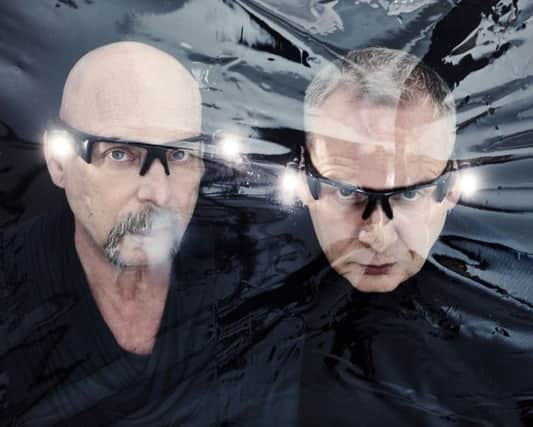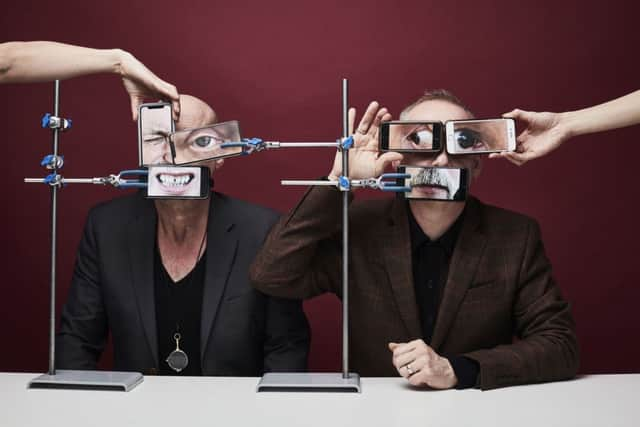Orbital: '˜My moral upbringing was listening to Crass and the Dead Kennedys'


Sibling rivalry is not uncommon in music, as the likes of the Everly Brothers, The Kinks, The Jesus and Mary Chain and Oasis could attest, but the divisions between Paul and Phil Hartnoll of electronic duo Orbital have certainly been as intense at times over the years as any rock ’n’ roll band.
The pair have gone their separate ways twice but have now reunited on their ninth studio album, Monsters Exist.
Advertisement
Hide AdAdvertisement
Hide Ad“I think on the slow burn I just missed my old job,” says Paul, who at 50 is four years his brother’s junior. “I think I was quite good at it.


“There’s nothing simple in life. It was a choice of go it alone and have no one come to see your gigs or put up working with your brother who you don’t like working with.
“But he is my brother and it was bad when you fall out and don’t talk to someone, so it was really good to patch it up with him. I just decided to put all the differences aside and live with it.”
Paul admits there were “a couple of catalysts” that pushed him “over the edge”.
Advertisement
Hide AdAdvertisement
Hide Ad“One I was working on [the soundtrack] for a period drama and that was going really well then all of a sudden, like they do on films all the time, I got sacked just like that. They said, ‘No, we’re moving on, bye’, with no explanation really. Then on top of that we got offered two fantastic headline slots at festivals for a band that didn’t exist and I said, ‘For God’s sake, this is silly’. If you believed in the stars aligning, everything was pointing to ‘Go back to Orbital’.
“I thought ‘What do I need to do? I need to start talking to my brother again’, and that was good. It’s never good not talking to one of your family members, it just hangs there like this dark mark in the back of your soul.”
It seems the pair have come to better understanding in their working relationship. “[Phil] doesn’t have the same work ethic as me, he doesn’t do what I do and I will happily run this ship alone if I have to, but if he turns up it’s great. I’d prefer not to work in the studio on my own but I can do it; it’s the same playing live, I can do it on my own. But it’s great to have someone else there vibing out with you. He is my brother and sometimes when his headspace is next to mine he starts really annoying me with that grin but he’s been doing it ever since I was born.”
Monsters Exist filters thoughts on global politics through their squat-punk roots. “My moral upbringing was listening to Crass and the Dead Kennedys,” says Paul. “I watch politics and it just seems like a load of guinea pigs running around whelping at each other, it’s so over-complicated. But then there are people I’m sure who will say I’m an idiot saying that. Each to their own but for me I’m observing the world and it seems to be going mad, particularly now, more than it has done for a while, and so the album is a reflection of that. It’s a score to that rather than telling people what to think. It’s an emotional response.”
Advertisement
Hide AdAdvertisement
Hide AdPhysicist and broadcaster Professor Brian Cox guests on the album’s closing track, There Will Come a Time. “I asked him on Twitter and it took 15 minutes for him to reply,” says Paul. “He said, ‘Yeah, totally up for it’, he’s great. He’s one of us anyway, he was the keyboard player in D:Ream, he’s a better keyboard player than I am. I’m not a better physicist than he is, which is really annoying.
“It was a no-brainer for me. I love physics, I’m a science fiction fan, what’s not to love about physics? I just like the message he always gets across. I love the way he’s brought physics to the armchair TV generation and he’s made it interesting for the whole family, which is no small task. David Attenborough did it for wildlife, which is probably an easier shot anyway. Johnny Ball – look what he did for maths, that was incredible. Now we’ve got Brian Cox doing it for physics.
“You can tell he has the same kind of worldview as us and it was brilliant to get that final kind of Brian lecture. It’s almost hypnotic to take you out of the album with a last thought about our finite place in the universe.”
Having formed Orbital in 1989 at the start of the rave scene, Paul can’t help looking back with affection. “It was like a bunch of young amateurs getting something together and turning it into a global industry, it was incredible. It’s the last big youth culture that actually spawned and grew out of Chicago house music, electro, hi-energy music, the whole gay scene, and then Factory Records, FON Records and ZTT – that wave of forward-looking British pop music – it all coalesced into rave via the medium of the punk DIY ethic. It was brilliant, it was so amateur and it was really democratic, everybody would chip in and help out and try to do the right thing, there were no egos or pop stars. That did develop, of course, over time, but if anyone was a kind of an ego we all tended to go ‘Urgh’ and shy away from them, they felt old-school.
Advertisement
Hide AdAdvertisement
Hide Ad“There was a whole wave of new record companies and managers and things really did change around that time.”
When working with other creative people, he notices there are “two types – pre-rave people and post-rave people. Pre-rave people never really got on that ship as it were and still bark orders at you and tell you what to do, then you’ve got the post-race people who are much more collaborative and say ‘Hey, let’s see what we can do; what do you think?’ It’s all more psychedelic. We saw it in telly programmes – post-rave we had Tellytubbies, that was a post-rave TV programme if ever I saw one.”
Paul still harbours ambitions plans for a ‘rave’ opera of sorts. “Every middle-aged artist has ambitions for a rock opera, don’t they?” he quips. “It’s what we do when we hit middle-age. I’d be failing in my duties not to have that on the go. I still want to do it. It’s starring Simon Day from The Fast Show as a homeless man. I was thinking it would be a musical but I realised it’s not. There would be more contemporary dance and it would be more like a gig – proper loud techno and synchronised dancing, telling the story through the medium of contemporary dance, then lots of comedy from Simon Day as the homeless man at the heart of it all and fair bits of horror as well.”
Orbital play at O2 Academy Sheffield on December 18. www.orbitalofficial.com